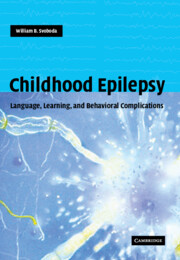Book contents
- Frontmatter
- Contents
- Preface
- Glossary
- 1 Looking ahead
- Part I Speech and language problems
- Part II Learning problems
- Part III Behavior problems
- 27 Mental health needs
- 28 Psychologic development
- 29 Seizure types and modifying factors
- 30 Overview: extrinsic factors
- 31 Behavior problems: general
- 32 Attention deficit disorders
- 33 Anxiety disorders
- 34 Mood disorders
- 35 Disruptive behavior problems
- 36 Psychoses of epilepsy
- 37 Non-epileptic events
- 38 Possible treatment issues
- 39 Helping with psychiatric problems
- 40 Epilog
- Index
40 - Epilog
from Part III - Behavior problems
Published online by Cambridge University Press: 26 October 2009
- Frontmatter
- Contents
- Preface
- Glossary
- 1 Looking ahead
- Part I Speech and language problems
- Part II Learning problems
- Part III Behavior problems
- 27 Mental health needs
- 28 Psychologic development
- 29 Seizure types and modifying factors
- 30 Overview: extrinsic factors
- 31 Behavior problems: general
- 32 Attention deficit disorders
- 33 Anxiety disorders
- 34 Mood disorders
- 35 Disruptive behavior problems
- 36 Psychoses of epilepsy
- 37 Non-epileptic events
- 38 Possible treatment issues
- 39 Helping with psychiatric problems
- 40 Epilog
- Index
Summary
The mere listing of an increased association of a particular language, learning, or behavior deviation with a seizure type does not signify that it will always appear with every person who has that type of seizure. Fortunately, only a few people are handicapped with any such problems, but for those patients the handicap may surpass the seizures in severity. In light of the vast array of variables, more time is spent in debate than in determing why such problems are increased in certain seizure syndromes.
If a minority of patients experience a language, learning, or emotional problem, but still that small occurrence is significantly greater than expected, then a correlation exists and needs to be understood. Even with a low incidence, to the person who has the disorder the incidence is 100%. To understand such relationships is to learn how to prevent or at least lessen the impact.
Comprehensive concern and care involves treating the whole person, not just the epileptic events, EEG deviations, or medication levels.
If there are any set rules on how to treat epilepsy, then they should consist of the following five basic commandments:
Treat the whole patient (and family), not just the seizures.
Treat the patient's needs, not just your own particular interests.
Treat as a team member, because no physician is able to know all or do all that is needed by the epileptic patient and their family.
Help others to treat the epileptic patient appropriately.
Continue to treat the patient, not just the seizures, until the epilepsy and all its complications are overcome.
- Type
- Chapter
- Information
- Childhood EpilepsyLanguage, Learning and Behavioural Complications, pp. 638Publisher: Cambridge University PressPrint publication year: 2004



